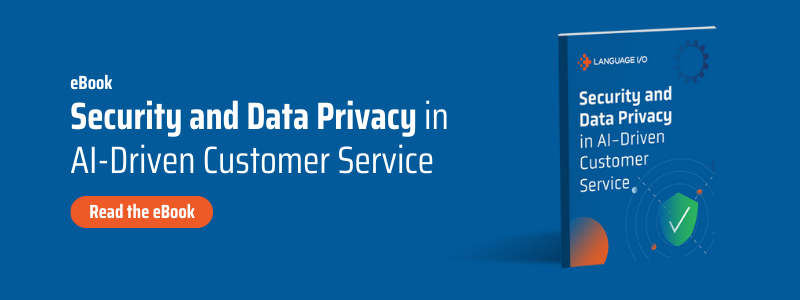The Importance of Data Privacy and Security in Customer Service Translation
Introducing a translation provider into your tech stack? Don’t let a vendor’s poor security compromise data privacy. Here’s what security measures to look out for, and why they’re so important.
Subscribe to our newsletter
Share
Using real-time translation software for customer service is becoming increasingly popular among global enterprises, and for good reason. Organizations that leverage this technology can efficiently reduce the cost of providing multilingual customer support, improve occupancy rates for individual agents and the team as a whole, and boost global customer satisfaction.
As customer service departments review options for providing this kind of multilingual support, there are a number of core factors that brand leaders must take into consideration. Chief among those factors is security.
Why Security Is So Important in Customer Service Translation
Take a look at some of your recent online conversations with customers. Maybe they occurred over email, over social media messaging, or perhaps in a live chat window. Either way, review the transcripts and note how often the following information about the customer comes up:
- First and/or last name
- Email address
- Phone number
- Date of birth
- Account ID
These are just some of the most common pieces of personally identifiable information (PII) that customers may share during the course of a conversation with a customer support representative. Depending on the nature of the services provided and the issue at hand, the conversation may include even more sensitive data, such as social security number or bank account information. Customers are willing to share this information with brands for two primary reasons: one, they want to resolve their issue quickly, so they aren’t as careful with their personal information as they otherwise might be; and two, they assume brands will keep their data safe.
With the rise of regulations such as GDPR and CCPA, it’s mandated that brands do keep that data safe. However, not all organizations realize that introducing machine translation (MT) software into their tech stack can pose a threat to security. When messages are sent to a technology provider for translation, how the MT platform handles any PII embedded in those messages is of critical importance to security.
For example, if a brand integrates with an MT provider that does not properly encrypt or otherwise protect PII, that customer data is likely being stored in a database somewhere on the MT provider’s server, just waiting for a malicious third party to hack into and get ahold of all that customer data.
Tips for Evaluating the Security of Translation Platforms
The risk of a security breach is scary, but the good news is that there are translation technology providers who properly handle and protect PII. Here’s how to determine if an MT provider can be trusted to handle your customer’s data.
- Start a dialogue about security as soon as possible. While translation quality and other features of a translation platform are obviously important, any platform that doesn’t adequately protect customer data should be removed from consideration immediately.
- Inquire about how the translation provider scans messages for personal data and what the technology does once it detects the presence of PII. If it doesn’t mask the customer data prior to sending it to its translation engine, that’s cause for concern.
- Determine how the provider handles PII after the translated conversation wraps up. What specifically is being stored, and where? What security protocol is in place to protect any stored data?
- Ask the technology provider what certifications they have to their name. Organizations with a commitment to security will be ISO 27001 certified by an independent and accredited certification body, as this certification is only awarded to organizations that adequately protect PII.
Language I/O’s Privacy Advantage
Organizations around the world use Language I/O to augment their multilingual support operations. The vast majority of our customers use our technology for real-time, conversational communication with customers, such as live chat translation. As a result, we process a massive amount of content with PII embedded every single day—and we have the measures in place to make sure that it’s kept secure.

When a message is sent to our platform for translation, the first step in our process actually has nothing to do with translation. Our first step is actually to scan the message for personal data, whether that’s the customer’s first or last name, their home address, or even their passport number. With all PII in a message identified, we encrypt that data. Only once we have all PII encrypted do we then move forward with the actual process of translating the content. And, once the conversation is all said and done, none of that data is stored in our database.
Want to learn more about how Language I/O can securely translate chat, email, chatbot, and social media messages into 150+ languages? Contact us or reach out for a demo.
